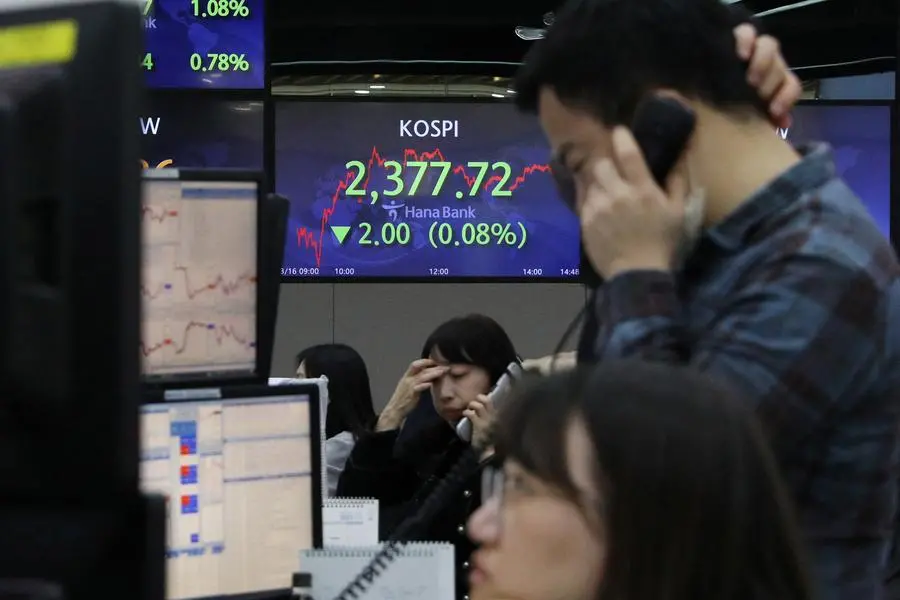PHOTO
LONDON - A rebound in Europe's battered banking shares was beginning to wane on Thursday, as a 50 billion Swiss franc ($53.94 billion) lifeline for beleaguered lender Credit Suisse teed up a pivotal European Central Bank interest rate decision.
Credit Suisse's shares were still up more than 20% after the Swiss National Bank and financial regulator, FINMA, had rowed in with support, but the broader European banking sector had given back much its 2.5% morning rally with the ECB now looming.
The SNB confirmed on Thursday that it will provide "liquidity" to the lender. Credit Suisse, which said it is taking "decisive action", will borrow up to 50 billion Swiss francs from one of the world's leading central banks.
Europe's banking stocks had suffered their steepest one-day drop in more than a year on Wednesday in the wake of the CS woes and though shares were backsliding again, bond traders at least still seemed confident enough ahead of the ECB to be selling safe-haven government bonds again.
ECB President Christine Lagarde has been widely signalling a 50 basis point hike, but the last week of turmoil, which has also seen two U.S. banks collapse, means markets now see it as roughly a 50/50 call between 50 bps and 25 bps.
"I worry that the ECB is not going to pay enough attention to this risk (banking sector problems) and that could be a mistake," said Stefan Gerlach, Chief Economist at EFG Bank in Zurich and a former deputy governor at Ireland's central bank.
The last week demonstrates what happens when major central banks like the U.S. Federal Reserve and the ECB raise interest rates by hundreds of basis points in a short period of time, he added.
"Whenever you do something that large, you know there is a risk waiting somewhere in the financial system," Gerlach said. "It is like stretching a rubber band, if you keep stretching it, is it going to break?"
Germany's two-year bond yield, which is highly sensitive to ECB rate expectations, was last up 18 basis points (bps) at 2.56% having plunged 54 bps on Wednesday in what had been a market-wide scramble for safety.
Overnight, Asian shares had fallen around 1% but it was largely a catch-up move and had none of the frenzy witnessed in Europe the previous day.
Wall Street futures were also pointing to a steady start there later while demand had dropped for both the dollar and gold, the traditional go-to plays for investors during market turbulence.
CONTAGION
Many investors though said it was far too early to give the all clear.
JPMorgan analysts said the loan from the SNB would not be enough to soothe investor concerns and the "status quo was no longer an option", leaving a takeover for Credit Suisse as the most likely outcome.
Moritz Kraemer, Chief Economist at LBBW Bank in Germany, said that while Credit Suisse wasn't an insolvency issue the way Silicon Valley Bank had been in the United States late last week but others remained jittery.
"The word contagion is knocking about," said Damian Rooney, a dealer at Perth stockbroker Argonaut. "We're getting fear across the whole board here," he said. "The trouble is with the unwinding - you don't know what you don't know."
Overnight, MSCI's index of Asia-Pacific shares outside Japan had dropped 1% to its lowest level this year. Japan's bank shares, which are also seen as vulnerable to interest rate rises, ended down 3.25% although had been down more at one point.
U.S. data showed another dip in unemployment claims. Two-year U.S. Treasuries are eying their best week since 1987 and yields, which fall when prices rise, are below 4% again and down more than 60 basis points since Friday.
The euro last stood 0.2% higher at $1.059 and the Swiss franc was up 0.8% at 0.9258 to the dollar. The preference for safety was still supporting the yen which was up 0.4% at 132.35 per dollar in London trading.
Oil prices also clawed back some ground after sliding to 15-month lows in the previous session. Brent crude futures were up 60 cents or 0.8% to $74.29 per barrel while West Texas Intermediate crude futures (WTI) rose to $68.08 a barrel.
($1 = 0.9270 Swiss francs)
(Writing by Marc Jones; Editing by Sharon Singleton, William Maclean)




















